Editors
Interviews - Editors
-
“Allow Myself to Work in the Same Mode as the Filmmaker”: Editor Christopher Radcliff on Palm Trees and Power Lines
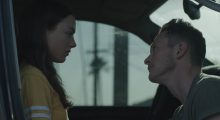
In Palm Trees and Power Lines, the feature debut of Jamie Dack, aprecocious but aimless 17-year-old named Lea finds herself drawn to Tom, a man twice her age who initially appears to give her the much-needed attention she does not have at home. As their relationship continues, however, Tom begins to assert his power in the relationship. Editor Christopher Radcliff explains the importance of keeping the film tied to Lea’s perspective and of editing the film to emphasize the patience evident in the script. Filmmaker: How and why did you wind up being the editor of your film? What were the […]
-
“We Didn’t Edit to the Script; We Edited Only With the Material”: Editor Lívia Serpa on Dos Estaciones
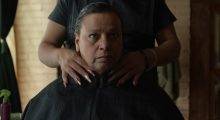
Dos Estaciones pulls equally from documentary and fictional aesthetics to tell its story of a tequila factory in the highlands of Jalisco. It devotes time not just to its protagonist, but also to the process of making tequila, the landscape and other inhabitants. Editor Lívia Serpa recounts how the edit was always based on the material at hand rather than the script and the emphasis on the overarching structure of the film. Filmmaker: How and why did you wind up being the editor of your film? What were the factors and attributes that led to your being hired for this job? […]
-
“This Film Expanded the Way I Think About Beauty and Form”: Editor Todd Chandler on I Didn’t See You There
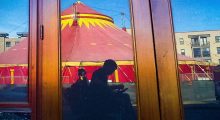
When a circus tent appeared outside the window of Reid Davenport, a visibly disabled filmmaker, he began to contemplate the history of the “freak show” and its relationship to his own aesthetics. This inquiry formed the backbone of I Didn’t See You There, for which Davenport captured images from his wheelchair and sought to make a film about how he sees the world. Below, editor Todd Chandler explains his desire to work on a film so aesthetically different from his own and why he likes to watch other films with his collaborators. Filmmaker: How and why did you wind up […]
-
“No Idea Was Out of the Realm of Possibility”: Editor Michael Felker on Something in the Dirt
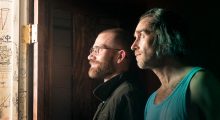
Something in the Dirt is the fifth feature by Justin Benson and Aaron Moorhead, indie multi-hyphenates who directed, wrote, shot, co-edited, and produced the story about a pair of fast friends who attempt to turn an encounter with the supernatural into fast money. Co-editor Michael Felker discusses how the film’s form enabled him to take risks and creatively approach the editing process. Filmmaker: How and why did you wind up being the editor of your film? What were the factors and attributes that led to your being hired for this job? Felker: I’ve been the editor for Benson and Moorhead’s […]
-
“The Best Scenes Tend to Land in the First Pass”: Editor Michael Aaglund on A House Made of Splinters
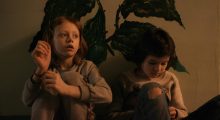
A House Made of Splinters, the second film by director Simon Lereng Wilmont after The Distant Barking of Dogs, takes place in an orphanage in eastern Ukraine, not far from the front lines. The film focuses on the impact war has on the development of the children as well as on the system that has failed to help war orphans. Michael Aaglund, who served as the film’s editor, discusses how he develops a scene in the cutting room and why he aims for simplicity. Filmmaker: How and why did you wind up being the editor of your film? What were the […]
-
“It Was Better to Encourage the Audience to Ask the Question Than to Provide the Answer”: Editor Justin LaForge on God’s Country

God’s Country is a study of the grieving process and the limits of societal polities. It follows a university professor, at the end of her rope because of her mother’s recent death and discrimination at work, who has her willpower put to the test after she confronts a pair of hunters trespassing on her property. Editor Justin LaForge explains how he was uniquely prepared to edit the film remotely during the COVID lockdown and why it’s better to let the audience ask a question than to preemptively provide an answer. Filmmaker: How and why did you wind up being the […]
-
“You Couldn’t Write This Story; No One Would Believe You if You Did”: Editor Berny McGurk on My Old School
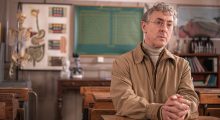
Brandon Lee, 16, moved from Canada to Glasgow and enrolled in Bearsden Academy after the death of his mother, where he impressed teachers with both his knowledge and his temperament: he protected bullied students and helped bullies reform. In My Old School, director Jono McLeod, a former classmate of Brandon, investigates his story. Below, editor Berny McGurk discusses his first experiences in the industry as a teenager and the importance of not overloading the audience and making sure every reveal lands when telling a true story with countless twists. Filmmaker: How and why did you wind up being the editor […]
-
“We Wanted to Find Moments That Celebrated Women Reclaiming Birth”: DP Jenni Morello on Aftershock
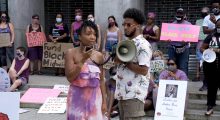
With Aftershock, Paula Eiselt and Tonya Lewis Lee turn their camera toward the crisis of the maternal mortality as it affects Black women in the United States. The film focuses on two widowers whose partners died preventable deaths during childbirth as they build support and rally for justice. Below, cinematographer Jenni Morello discusses the challenges of shooting a vérité when everyone is masked and the search for something unusual in every shot. Filmmaker: How and why did you wind up being the cinematographer of your film? What were the factors and attributes that led to your being hired for this […]
-
“He Knew Exactly What Movie He Wanted to Make”: Editor Henry Hayes on Cha Cha Real Smooth
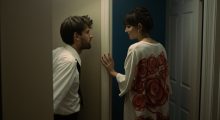
Cooper Raiff’s follow-up to his 2020 SXSW winner Shithouse follows a recent alum who, unable to find a career path, moves back home and begins to work as a party-starter for his younger brother’s classmates. When he befriends a local’s mom, he begins to imagine a different future for himself. Editor Henry Hayes balancing humor and pathos and how working with friends and on small projects gave him space to experiment. Filmmaker: How and why did you wind up being the editor of your film? What were the factors and attributes that led to your being hired for this job? Hayes: […]
-
“My Process was Much Like Design Brainstorming”: Editor Anisha Acharya on Neptune Frost
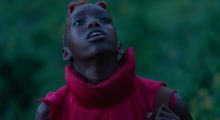
Although its distinct color palette is more immediately noticeable, Neptune Frost, a directorial collaboration by slam poet Saul Williams and actress-cinematographer Anisia Uzeyman, also weaves a complex Afrofuturist narrative into a musical that brings pressing political questions about colonialism, environmentalism, and more to the forefront. Editor Anisha Acharya explains how a plethora of narrative interpretations informed the final product, and how the filmmakers struck a balance between complexity and accessibility. Filmmaker: How and why did you wind up being the editor of your film? What were the factors and attributes that led to your being hired for this job? Acharya: […]
